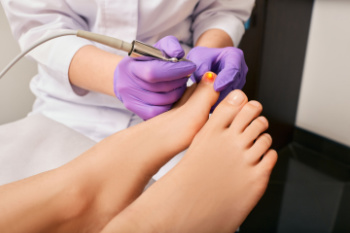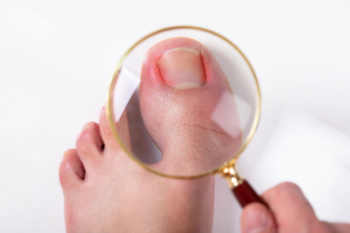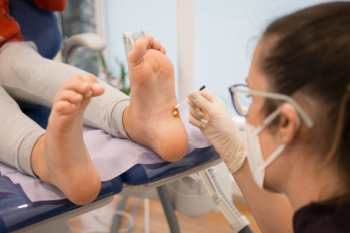Connect With Us
Blog

Laser treatment for fungal nails has drawn attention as a potential solution for addressing this common and often stubborn condition. One of the significant advantages of laser therapy is its non-invasive nature, offering a relatively painless and quick procedure compared to traditional treatments like oral medications or topical antifungal creams. Laser treatment targets the fungus directly, penetrating the nail bed without causing damage to surrounding tissues. Additionally, it typically requires minimal downtime, allowing patients to resume their daily activities immediately after the procedure. However, laser therapy may not be suitable for everyone, and its efficacy varies among individuals. Some individuals may require multiple sessions to achieve satisfactory results, and there is no guarantee of complete eradication of the fungal infection. Overall, while laser therapy presents potential benefits for treating fungal nails, patients should weigh these against the associated drawbacks and consider all treatment options in consultation with their podiatrist. If you have toenail fungus and are considering this type of treatment, it is suggested that you speak with this type of doctor who can address any concerns you may have.
Laser treatment can be an effective way to get rid of toenail fungus. If you have any questions about laser treatment, consult with Leonard Talarico, DPM from Georgia. Our doctor will assess your condition and provide you with quality treatment for fungal nails.
What Are Toenail Fungal Infections?
Onychomycosis, or fungal infection of the nail, is a relatively common and non-serious condition. Around 10 percent of U.S. citizens are afflicted with fungal nails. Common forms of fungus that infect the nail include dermatophytes, yeasts, and molds.
Symptoms of Toenail Fungal Infections Include:
- Nail thickening
- Brittleness of the nail
- Discoloration of the nail
Diagnosis for Fungal Nails
Fungal infections are diagnosed by fungal culture and microscopy. This will rule out any other conditions such as nail trauma, psoriasis, lichen planus, and onychogryphosis.
What Is Laser Treatment?
Laser treatment is a non-invasive, safe, quick, and painless procedure that uses the heat from a laser to kill fungus in the nail. Each infected nail is targeted with a laser for several minutes. The treatment is usually utilized several different times over a select period. During this time, a podiatrist will keep an eye on the infection.
If you have any questions, please feel free to contact our office located in Pooler, GA . We offer the newest diagnostic and treatment technologies for all your foot care needs.

An ingrown toenail, a common foot condition, occurs when the edge of the toenail grows into the surrounding skin, leading to pain, swelling, and discomfort. This condition typically affects the big toe but can occur on any toe. Ingrown toenails can develop due to a variety of factors, including improper nail trimming techniques, wearing tight-fitting shoes, or sustaining toe injuries. Additionally, individuals with curved or unusually shaped toenails may be more prone to ingrown toenails. Symptoms of ingrown toenails include redness, tenderness, and inflammation around the affected nail, as well as the presence of pus or drainage in severe cases. If left untreated, ingrown toenails can become infected, causing further pain and complications. Recognizing the causes and symptoms of ingrown toenails is important for prompt treatment and prevention strategies. If you have developed an ingrown toenail, it is suggested that you contact a podiatrist who can treat this condition, which may include minor surgery for partial or total removal.
Ingrown toenails can become painful if they are not treated properly. For more information about ingrown toenails, contact Leonard Talarico, DPM of Georgia. Our doctor can provide the care you need to keep you pain-free and on your feet.
Ingrown Toenails
Ingrown toenails occur when a toenail grows sideways into the bed of the nail, causing pain, swelling, and possibly infection.
Causes
- Bacterial infections
- Improper nail cutting such as cutting it too short or not straight across
- Trauma to the toe, such as stubbing, which causes the nail to grow back irregularly
- Ill-fitting shoes that bunch the toes too close together
- Genetic predisposition
Prevention
Because ingrown toenails are not something found outside of shoe-wearing cultures, going barefoot as often as possible will decrease the likeliness of developing ingrown toenails. Wearing proper fitting shoes and using proper cutting techniques will also help decrease your risk of developing ingrown toenails.
Treatment
Ingrown toenails are a very treatable foot condition. In minor cases, soaking the affected area in salt or antibacterial soaps will not only help with the ingrown nail itself, but also help prevent any infections from occurring. In more severe cases, surgery is an option. In either case, speaking to your podiatrist about this condition will help you get a better understanding of specific treatment options that are right for you.
If you have any questions please feel free to contact our office located in Pooler, GA . We offer the newest diagnostic and treatment technologies for all your foot and ankle needs.

Viral and plantar warts are two foot conditions caused by the human papilloma-virus, abbreviated HPV. Viral warts, also known as common warts, typically appear as small, raised bumps with a rough texture on the surface of the skin. These warts can develop anywhere on the foot but are commonly found on pressure points like the heels or balls of the feet. Conversely, plantar warts specifically affect the soles of the feet, often appearing flat with a thickened callus-like texture and tiny black dots, known as wart seeds, within them. Both types of warts are contagious and can spread through direct contact or by walking barefoot in public areas like swimming pools or gym locker rooms. While viral and plantar warts are generally harmless and may resolve on their own over time, some cases may require specialized treatment to alleviate discomfort and prevent further spread. If you have developed warts on your foot, it is suggested that you visit a podiatrist who can effectively treat them.
Plantar warts can be very uncomfortable. If you need your feet checked, contact Leonard Talarico, DPM from Georgia. Our doctor will assist you with all of your foot and ankle needs.
About Plantar Warts
Plantar warts are the result of HPV, or human papillomavirus, getting into open wounds on the feet. They are mostly found on the heels or balls of the feet.
While plantar warts are generally harmless, those experiencing excessive pain or those suffering from diabetes or a compromised immune system require immediate medical care. Plantar warts are easily diagnosed, usually through scraping off a bit of rough skin or by getting a biopsy.
Symptoms
- Lesions on the bottom of your feet, usually rough and grainy
- Hard or thick callused spots
- Wart seeds, which are small clotted blood vessels that look like little black spots
- Pain, discomfort, or tenderness of your feet when walking or standing
Treatment
- Freezing
- Electric tool removal
- Laser Treatment
- Topical Creams (prescription only)
- Over-the-counter medications
To help prevent developing plantar warts, avoid walking barefoot over abrasive surfaces that can cause cuts or wounds for HPV to get into. Avoiding direct contact with other warts, as well as not picking or rubbing existing warts, can help prevent the further spread of plantar warts. However, if you think you have developed plantar warts, speak to your podiatrist. He or she can diagnose the warts on your feet and recommend the appropriate treatment options.
If you have any questions please feel free to contact our office located in Pooler, GA . We offer the newest diagnostic and treatment technologies for all your foot and ankle needs.
